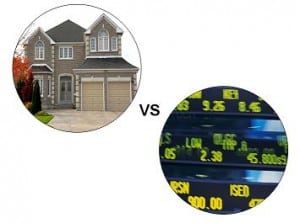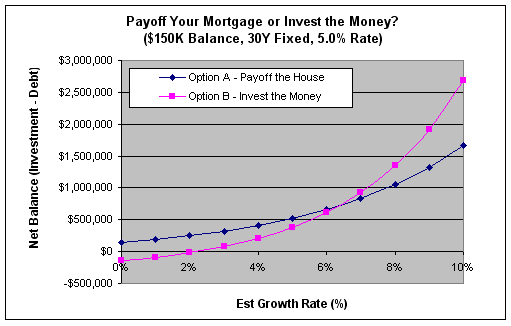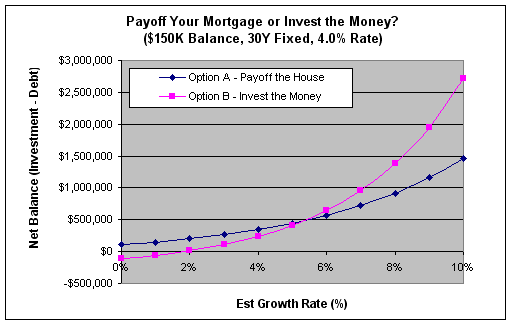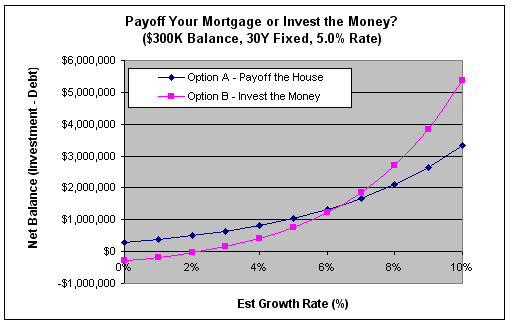Back to the Question:
So after the previous example, you’d probably think that that was the answer and we’re all done. Unfortunately, it’s not that simple. There are two main variables that change the circumstances:
1) Interest Payments.
Let’s look at the cost of that mortgage again.
If you bought a house for $150,000 and paid the entire balance today, what would it cost you? It would only cost $150,000. There wouldn’t be any interest to pay. (Note: For simplicity, we are ignoring any closing fees and payoff charges).
If you bought the house for $150,000 and paid the mortgage over the course of 30 years, what would it cost you? It would cost you $289,883.68 ($150,000 for the principal balance and $139,883.68 in interest over 30 years). Basically, you’d have almost twice as much money leaving your pocket.
Therefore, when we calculate the future value of our options, we need to look at the NET balance of our money as follows:
• Option A: [Future value of monthly $805.23 payments] – [$150,000]
• Option B: [Future value of initial $150,000] – [$289,883.68]
2) Rate of Return.
In the above example, we assumed that your money would grow at the same rate of return as the interest rate of your mortgage. Although 5.00% sounds great by today’s standards, it would have been considered a joke during certain stretches over the past 30 years. Let’s take our well-known historical stock market 8% annual average return and see which one leaves you with more money:
In fact, we can calculate the net balance of our portfolio for any interest rate:
How These Two Variables Affect the Answer:
As you can see, the answer to which option is better depends on what rate you believe you will earn over the course of 30 years. Here are some general observations:
• At approximately +1 percent above the interest rate of your mortgage, the net return of both investments is equal. This is called the “break-even point”.
• If you think you’ll earn less than the interest rate of your mortgage + approximately 1%, then paying off the house (Option A) is the better option.
• If you think you’ll earn more than the interest rate of your mortgage + approximately 1%, then investing your money (Option B) is the better option.
Let’s see what happens to this graph when we reduce the mortgage to a 4.00% interest rate.
What about if raise our money value to $300,000 (buy a more expensive house for $300,000 or invest the $300,000)?
As you can see, our observations still hold true.
Other Important Factors That Can Influence the Answer:
1) Other Types of Mortgages: In all of our examples, we used a fixed rate, 30-year mortgage. Our break-even point may be very different for a 15-year mortgage or adjustable-rate mortgage (ARM).
2) Half-Way Into Your Mortgage: In all of our examples, we looked at the mortgage at the very beginning (when we would stand to pay the most amount of interest). If you are already 10 or 20 years into your mortgage payments, chances are you have already paid off a significant amount of your interest. This is because:
• Each time you make your fixed monthly payment, the ratio of how much you pay in principal versus interest changes. You start by paying off most of the interest and less principal, and gradually pay more and more principal each time as the interest gets paid off. The reason for this is because the bank wants their interest payments first, so your monthly payments are structured in this way.
Therefore, if you are half-way into your mortgage payments, the difference between how much debt you’ve already paid versus how much debt you still owe will be much less than it was at the beginning of the mortgage process. Therefore, the break-even point will be much closer to the interest rate of your mortgage than in our example.
3) Taxes: The interest you pay on your mortgage is tax deductible. If you were to suddenly pay off your mortgage, this may have serious implications on the amount of money you will expect to receive on your income tax refund.
In addition, your choice in “investment” may also have serious tax implications. For example, if you chose a Roth IRA, you’re tax situation would not change because you’d have funded it with after-tax dollars. If you had choose an annuity, there may be fees and other taxes which would reduce your earnings. Every option would have its own impact on how we answer this question.
4) Home Value: If you had bought your house in 2005 and watched the price tumble in half to the lows of 2008, then I’m sure there would be no argument which “investment” was better. Someday home values will return, but until then, you need to consider if you want to sink you money into your house when you may not be able to get it back out in the short term.








Leave a Reply